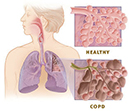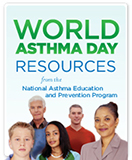COPD Learn More Breathe Better®

Chronic Obstructive Pulmonary Disease (COPD) is the third leading cause of death in the United States and poses an immense burden on individuals and health care systems.
This issue, featuring information for people who have been diagnosed with COPD, as well as health care providers, is brought to you by the National Heart, Lung, and Blood Institute (NHLBI), a part of the National Institutes of Health (NIH). The NHLBI provides leadership in research, training and education programs to promote the prevention and treatment of heart, lung, blood and sleep disorders.
Featured Health Information

The NHLBI’s campaign, COPD Learn More Breathe Better®, provides educational resources designed to raise awareness about COPD and to encourage those at risk to get a simple breathing test and talk to their health care providers about treatment options. A National Action Plan for addressing COPD will be launched this spring.

Breathing Better With a COPD Diagnosis is a fact sheet that lists some of the steps COPD patients can take to breathe better and improve their quality of life.

Six Tips for Talking to Loved Ones About COPD is a tip sheet that aims to educate people on how they can recognize the symptoms of COPD in their loved ones and offers tips to help guide conversations about this serious lung disease.

Get the Most From Your Office Visit is a fact sheet designed for those who think they may be suffering from COPD to help them make the most of their time with their health care provider.

Talking With Your Patients About COPD is a free tool that helps health care providers assist their patients in overcoming some common communication barriers and start the conversation about COPD.
News & Events

May is Asthma Awareness Month. The National Asthma Education and Prevention Program, coordinated by the NHLBI, encourages clinicians and others to focus on identifying allergens and irritants that can lead to asthma attacks. Such triggers are unique to each person, but can include tobacco smoke, outdoor air pollution, dust mites, pet dander and more.
Learn more about asthma and how you can raise awareness in your community.
